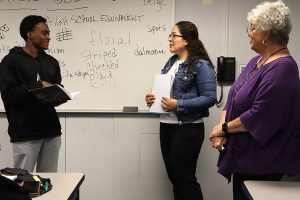The Astronomy program is a transfer program that is approved by the Illinois Board of Higher Education and ICCB. The program gives an overall view of modern astronomy with emphasis on an understanding of the structure and properties of the universe, from the earth to the most distant galaxies discernible. In addition, there are laboratory experiments embedded within the curriculum that allow the students to have a real feel of what astronomy entails. At the end of the program, students will have earned an AS.
Mission
The mission of the Astronomy program is to prepare students for a seamless transfer into a four-year institution to earn a BS or higher degree in applied Astronomy that will enable them to become the next pioneers and researchers of the galaxy.
Student Learning Outcomes (SLOs)
At the conclusion of the course, the student will be able to:
- Identify actual and apparent motions of the stars, sun, moon, and planets.
- Explain presently accepted ideas for the age, formation, and composition of our solar system.
- Describe the physical makeup of each of the planets (both terrestrial and jovian), their satellites, the asteroids, etc.
- Describe the possible size and extent of our universe.
- Describe the electromagnetic spectrum and explain how the universe is studied using its various wavelengths.
- Describe the various types of stars, their differing makeups, and how astronomers categorize them.
- Demonstrate a general knowledge of blackholes and warped spacetime.
- Discuss their own beliefs regarding the possibilities of life elsewhere in the universe.
Overview for College Success
Overview for College Success (OCS 121) is a course designed to assist students in the navigation of becoming successful in college and life. Major topics include setting academic, career and personal goals; effective communication strategies; study skills; critical thinking; self-discovery; and learning styles. In addition, this course delves into topics such as stress management, diversity and other well-being topics. Students will develop educational and career plans, learn to utilize college resources and receive extensive help in course planning. OCS 121 credit is not calculated in the course minimum credit totals listed in this section.
Students must take OCS 121 if they meet one or more of the following:
- First time degree seeking students.
- Transfer student with less than 12 credit hours and no evidence of similar course on transcript.
- Registering for 6 or more credits.
- Test into 2 or more developmental classes.
- Currently does not have OCS credit or registered for OCS.
Recommended AS Transfer Curriculum for Astronomy
This is only a suggested transfer program and might not be appropriate for every student. Some four-year institutions accept more than 62 credit hours in transfer to fulfill requirements in astronomy. Consult the College & Career Success Center for help in selecting courses appropriate for the program at the college or university where you plan to transfer.
Faculty are available during scheduled office hours to advise students about their program and career opportunities. Peruse some of the offerings in the Physical Sciences Department.
Minimum General Education (45)
| Overview for College Success | CREDITS | |
|---|---|---|
| OCS 121 | Overview for College Success | 1 |
| Communications (9) | ||
|---|---|---|
| ENG 101 | Composition and Rhetoric | 3 |
| ENG 102 | Composition and Research | 3 |
| SPE 108 | Oral Communication | 3 |
| Humanities and Fine Arts (9) | ||
| GROUP II | Select from Humanities Electives Students earning an Associate degree must meet the requirement for coursework on improving human relations as defined in Public Act 87-581. |
9 |
| Social and Behavioral Science (9) | ||
| GROUP III | Select from Social Science Electives Students earning an Associate degree must meet the requirement for coursework on improving human relations as defined in Public Act 87-581. |
9 |
| Mathematics (5) | ||
| MTH 190 | Calculus and Analytic Geometry I | 5 |
| Physical and Life Science (8) | ||
| CHM 113 | General Chemistry I | 5 |
| GROUP V | Select from Life Science Electives | 9 |
Area of Concentration/Electives (22)
The selected electives listed below may satisfy the additional Math and Physical or Life Science courses required for the AS. This is only a suggested transfer program and might not be appropriate for every student. Some four-year institutions accept more than 62 credits in transfer to complete requirements in geography. Consult the College & Career Success Center for help in selecting courses appropriate for the program at the college or university where you plan to transfer.
| AST 101 | Introduction to Astronomy | 5 |
| CHM 114 | General Chemistry II | 5 |
| PHY 210 | University Physics I | 4 |
| PHY 211 | University Physics II Many four-year institutions may also require PHY 212. |
4 |
| MTH 203 | Calculus and Analytic Geometry II Many four-year institutions require MTH 204. |
5 |
| Minimum for AS Degree | 62 | |
|---|---|---|




